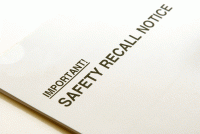Categories
- Additional Insured
- ChildrensProducts
- Claims Made
- Cyber Insurance
- Dietary Supplements and Nutraceuticals
- Ecigarettes
- Firearms Insurance
- Food Products
- Foreign Products Liability
- Foreseeable Misuse
- Frivolous Lawsuits
- General Liability
- Industrial
- Infographics
- Intellectual Property
- Looking ahead
- Marijuana Liability
- Medical Products
- Mutual Indemnification
- Nano Technology
- News
- Online Sellers Insurance Requirements
- Outsourcing
- Piercing The Corporate Veil
- Pollution Liability
- Product liability
- Product Recall
- Retail Chain Store
- Start-Up Business
- Statute of Repose
- Surplus Lines Insurance
- Technology
The high cost of not reporting product safety issues

Company penalized $4.64M for allegations of failure to report
Apparently not everyone is familiar with the adage that ignoring a problem won’t make it go away. And when you’re talking about product safety, ignoring a problem not only won’t make it go away, it can cost you big time.
Viking Range incurred a $4.64 million civil penalty in a settlement with the Consumer Product Safety Commission for failing to report a product safety issue. Viking allegedly received nearly 200 reports about a defect in its gas ranges causing them to spontaneously turn on. Two of the incidents resulted in injuries.
Unfortunately, Viking only notified the CPSC in 2014, which led to a recall in 2015.
Your responsibilities when a defect is suspected
Manufacturers, distributors, importers, and retailers are required by law to report within 24 hours any information indicating a product with a defect that could result in a substantial hazard. The CPSC allows companies 10 days to investigate whether such a report should be made. This includes products that did not cause injuries. It’s not unusual for products that haven’t triggered injuries to be recalled.
By following three important guidelines, products manufacturers, distributors, importers, and retailers can prevent such penalties by the CPSC.
- Err on the Side of Caution
Your company’s initial communication to the CPSC should state that you’re reporting due to caution, not admitting to a product hazard. The CPSC and your company will investigate the issue. If the decision is that corrective action isn’t necessary, it closes the case.
However, if a recall is required, a voluntary recall is typically announced in a joint press release by the CPSC and the reporting company. The press release should include information about how consumers can be refunded or obtain either a repair or replacement product.
- Provide Accurate Data
It’s critical that your reports always reflect accurate information that provides:
- the population size of the product with potential safety issues
- the number of incidents, including injuries
- test reports
A company that commits “knowing violations” can be fined millions of dollars, to say nothing of the potential for a public relations disaster. A knowing violation is when the company either has actual knowledge or presumed knowledge of an issue. Including any of the following in reports can lead to trouble:
- Stating falsely that a product complies with required safety standards
- Stating falsely that a product has passed safety tests
- Concealing any safety fixes made prior to a report
- Have a Risk Management Plan
Any company producing or distributing consumer products should have a compliance officer or team and written manual in place. It’s critical that any potential product hazards are quickly and accurately identified, and that the necessary reports are made in a timely manner. It’s the responsibility of the compliance team to maintain accurate product records. These teams should also be able to communicate directly with senior management and legal counsel as CPSC-related reporting decisions typically need to be made quickly.
The bottom line
Another good adage that can be applied to consumer products is “the best defense is a good offense.” By following these guidelines you’ll likely circumvent issues with the CPSC and lower your risk of a product liability lawsuit.
Source: Robert Hopkins and Bryan Gales. “3 Guidelines for Avoiding CPSC Penalties.” duanemorris.com. 01 May 2017
-
 Click the Button Below to Get Your
Click the Button Below to Get Your
No-Obligation Quotes from Among the
Top 18 Leading Insurance Carriers Today -
Recent Industry News
- Amazon Sellers and Vendors Strategy Including Insurance Requirements
- Walmart Sellers Insurance
- Product Liability Limit Requirements of Online Sellers
- State-by-State Product Liability Analysis of Laws Impacting Businesses
- Children’s Product Liability: Strange Claims and Need for Insurance
- Product Liability vs. Environmental Insurance for the Chemical Industry
- Product Liability in the 3D Printing Industry: New Materials and Their Significance
- Product Liability Concerns in Agricultural Equipment Enhanced with Artificial Intelligence
- Navigate Product Liability in Battery and Solar Industry
- Cyber Risk Insurance Is Essential Business Insurance in Today’s Modern World
Monthly News Archives
